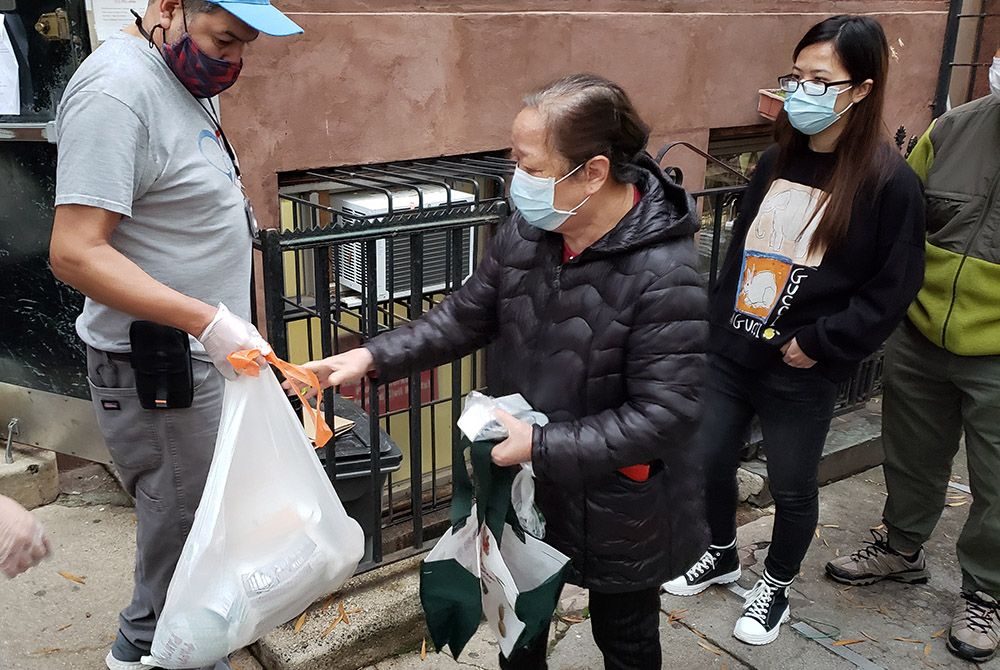
Those in line for food packages outside Cabrini Immigrant Services on Oct. 27 received a frozen chicken, milk, tea, rice, beans, potatoes and other vegetables. Many of those receiving the packages are elderly neighborhood residents of Chinatown, who themselves may not be working but have younger family members who have lost jobs during the economic downturn. (GSR photo/Chris Herlinger)
On the last Tuesday of October, a line of about 60 people, orderly and quiet, wrapped around the block that houses the social service agency Cabrini Immigrant Services of New York City and neighboring St. Teresa's Church, waiting for the weekly food pantry to open.
At the head of the line stood Sr. Yolanda Flores, attentively checking IDs, patiently answering questions and making sure things ran smoothly. They nearly always do, even with increased demand for food in the midst of a difficult time in the neighborhood.
Flores, a Nicaragua-born member of the Missionary Sisters of the Sacred Heart of Jesus and Cabrini Immigrant Services' family program coordinator, helps organize the Tuesday morning distribution from one of the largest weekly food pantries in this part of Manhattan, anchored in the Chinatown area. Though the food pantry is among its most visible programs, the agency also provides legal services and education, cultural and family programming.
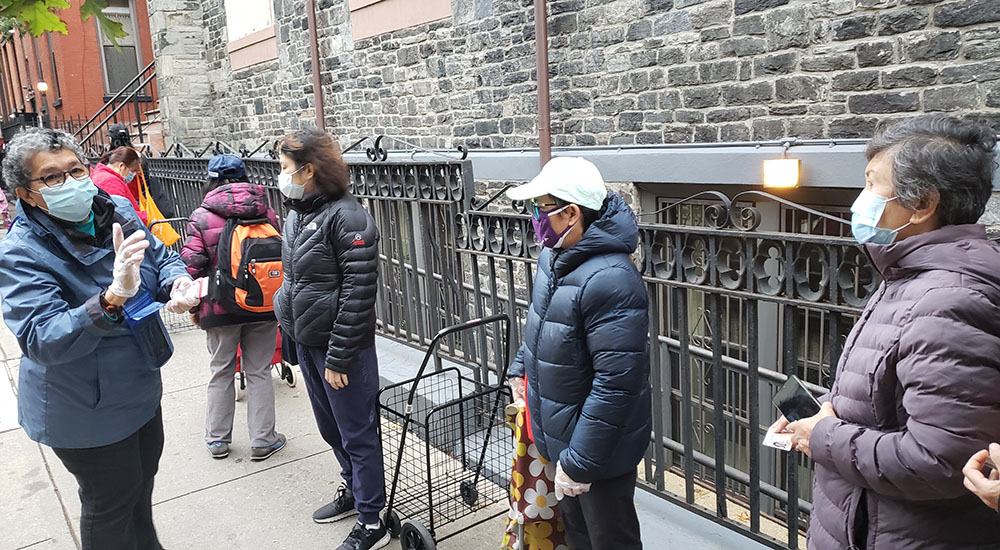
Sr. Yolanda Flores, left, talks to people in line for Cabrini Immigrant Services' weekly food pantry in Manhattan's Lower East Side on Oct. 27. (GSR photo/Chris Herlinger)
Pre-pandemic, the weekly pantry would provide food for about 200 to 300 people; now, the numbers have roughly doubled.
"The pandemia has been a real challenge," Flores said during a short break during the morning's activities, which began at about 7:30 a.m. By about 10 a.m. or so, the food packages were nearly cleared out; the demand often outstrips what is available.
That is a source of frustration, Flores said, but is not surprising. Most of those receiving the packages — which on this particular day included a frozen chicken, milk, tea, rice, beans, potatoes and other vegetables — are elderly neighborhood residents, nearly all Asian, who themselves may not be working but have younger family members who have lost jobs during the economic downturn.
"No work, no jobs," Flores said.
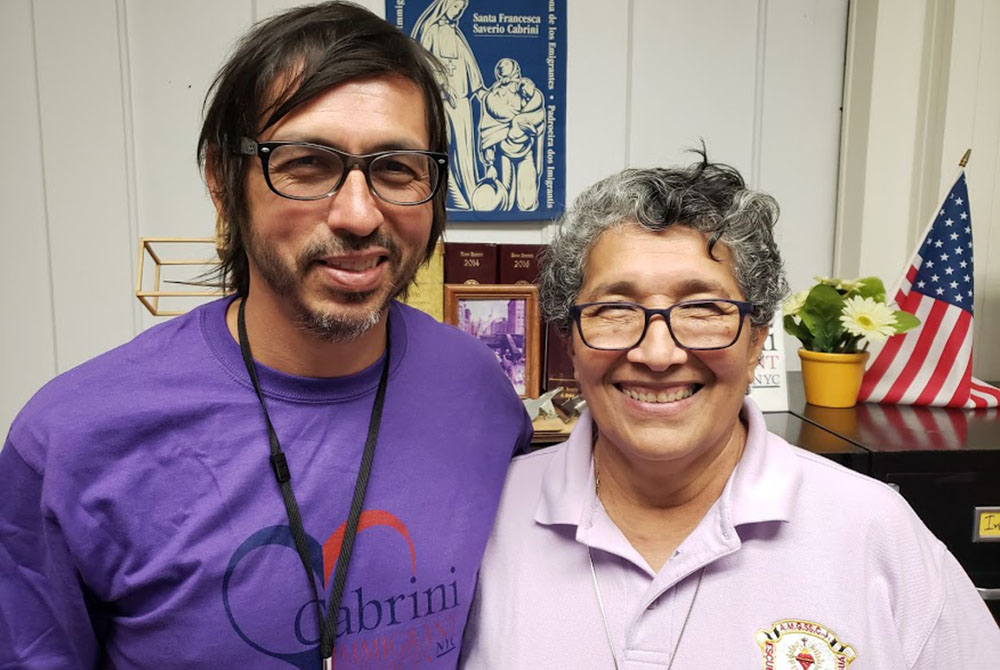
Javier Ramirez Baron, left, Cabrini Immigrant Services executive director, and Sr. Yolanda Flores, a Nicaragua-born member of the Missionary Sisters of the Sacred Heart of Jesus and Cabrini's family program coordinator, in 2019. (GSR photo/Chris Herlinger)
Like other social services agencies, Cabrini has had to readjust and retool during the pandemic. Its offices in Chinatown initially closed during the first weeks of the pandemic, though Cabrini, like many agencies, quickly readjusted and began moving its regular services, like legal counseling, online.
Cabrini's executive director, Javier Ramirez Baron, said in an interview that the staff and the agency's clients have weathered a challenging moment well.
"It was a huge change, but it's worked great," said Ramirez, who estimates that the agency has assisted more than 50,000 people since it was founded in 1999.
He said clients, staff and volunteers have all adapted, switching many programs — legal services, individual counseling, community workshops and even Zumba exercise classes — onto platforms like Zoom and Facebook.
The change even expanded the agency's reach beyond New York City, with people joining online programs from neighboring East Coast states like Connecticut and Maryland.
"Sometimes, in a moment of crisis, you have to discover ways to be creative," said Ramirez, who is originally from Colombia.
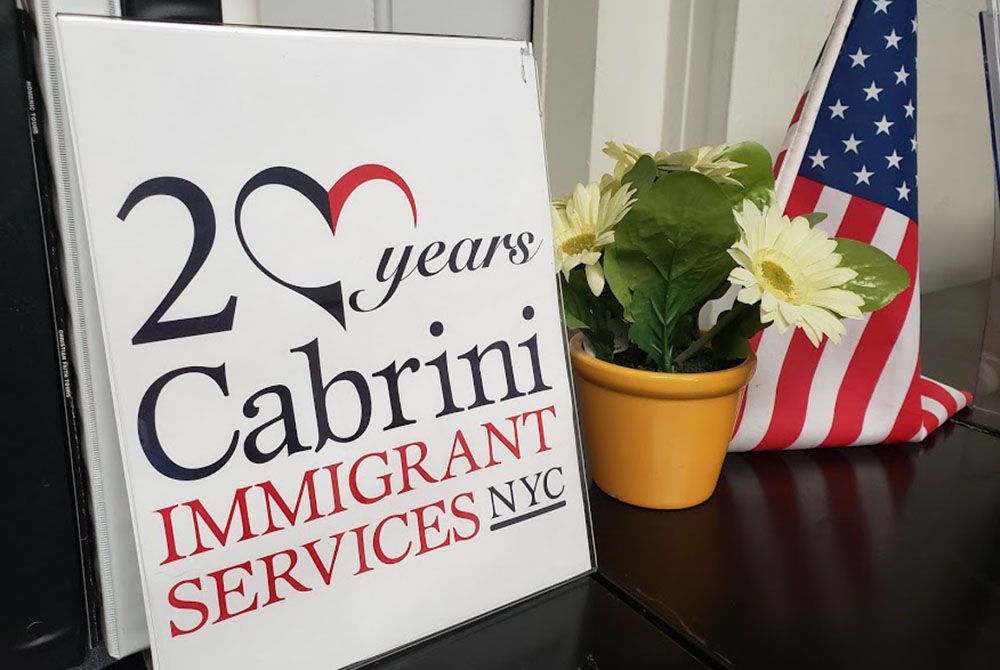
A display in the Lower East Side offices of Cabrini Immigrant Services notes last year's 20th anniversary of the social service agency, which offers a variety of services to immigrants. (GSR photo/Chris Herlinger)
Founded in 1999, Cabrini Immigrant Services was originally established as a ministry of the Cabrini Nursing & Rehabilitation Home, an institution founded and then run by the Missionary Sisters. The nursing home eventually closed and Cabrini Immigrant Services became independent, according to an online history of the organization.
With Missionary Sisters working and volunteering at the agency, and with the agency a sponsored congregational ministry, ties to the congregation continue. And the organization makes its legacy known: "Frances Xavier Cabrini, the patron saint of immigrants, was the founder of the Missionary Sisters of the Sacred Heart of Jesus, and it is in her spirit that CIS-NYC functions within our mission to empower immigrants, their families and their communities through education, access to essential services, civic participation and community building."
The focus of that agency's mission remains assisting immigrants in the New York City metropolitan area, including 800 families who regularly receive food packages. In addition, thanks to donations from a number of private foundations and donors, Cabrini provided 160 families financial support to help during the difficult, even harrowing, early pandemic months, when COVID-19 hit New York City immigrant communities particularly hard.
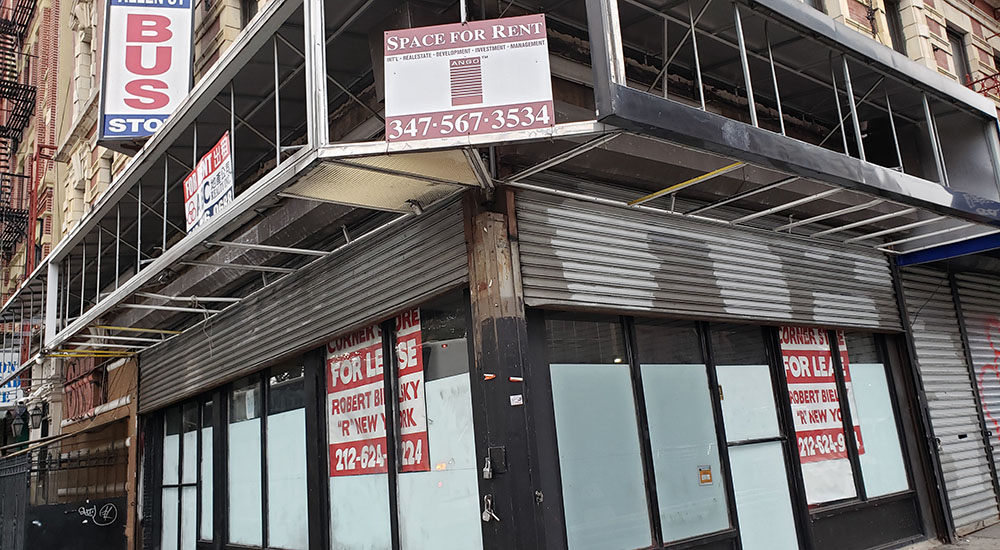
A vacant business storefront in New York City's Chinatown, located several blocks west of Cabrini Immigrant Services, illustrates the pandemic-related economic downturn affecting New York City. (GSR photo/Chris Herlinger)
Flores noted with palpable pride that throughout all stages of the pandemic so far, the pantry continued its work uninterrupted, though with adjustments.
"We kept it running. But we were careful," she said. For example, those receiving food had to receive it in packages and not in the organization's previous grocery-shopping style.
The weekly emergency food pantry will take a pause for now and possibly resume with the coming of end-of-year holidays, Flores said, but food packages will continue to be distributed to regular clients, she said.
"We need to take a break," Flores said. "It's been a difficult time."
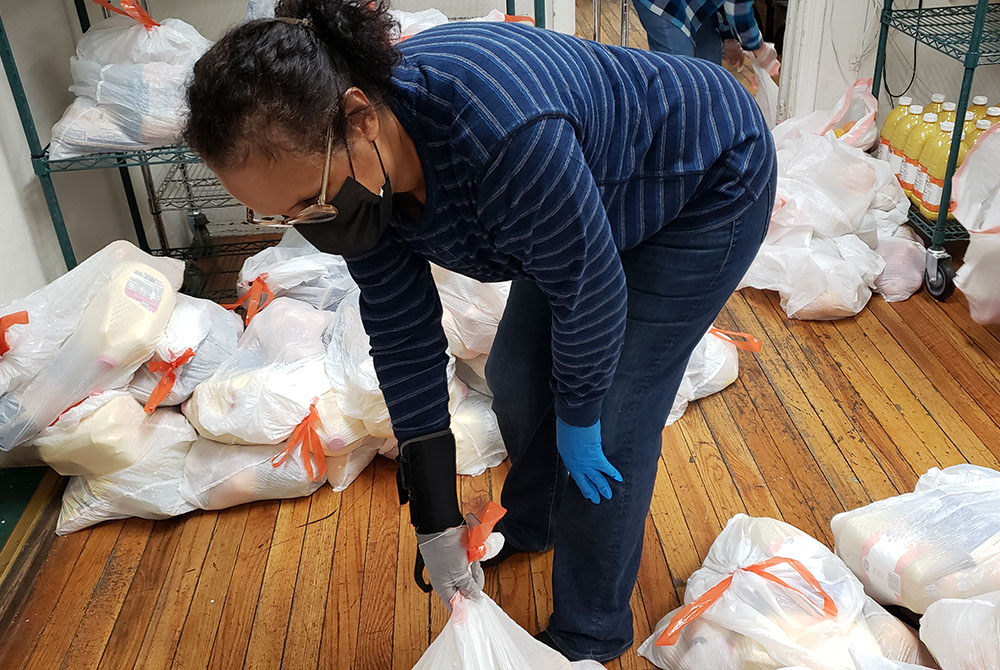
Volunteer Heather Lee organizes food packages to be distributed Oct. 27 at Cabrini Immigrant Services, located in Lower East Side, Manhattan, New York City. (GSR photo/Chris Herlinger)
While efforts to continue support to the immigrant community are ongoing, Ramirez said the pandemic came during a tumultuous time, anyway: In the last four years, immigrants in the United States have faced cultural and political headwinds, with the Trump administration instituting tougher immigration policies that have made life more difficult for those seeking to enter the country legally.
"Those dreams have been postponed for years," Ramirez said, adding that legal caseworkers have had to work "day and night" to sort out new federal regulations.
Ramirez said in a Nov. 9 email that with the apparent victory of President-elect Joe Biden, Ramirez and others on the Cabrini staff are "very optimistic" and have "renewed hope" that a new administration "will end the family separation and children in cage policies, end unjust deportations and restore DACA" — a reference to the Deferred Action for Childhood Arrivals program, which the Trump administration had sought to end. The Supreme Court blocked that move, but as CNN noted, the administration has continued to chip away at the program.
Ramirez said he hopes Biden follows through on a proposal "to present to the Congress a comprehensive immigration legislation with a clear path to citizenship for millions of undocumented immigrants within the first 100 days of his administration."
Still, Ramirez acknowledged that he and other immigrant advocates recognize that "things won't be easy" for immigrants, whoever is president.
Even so, Ramirez and Flores take inspiration from the example of Frances Cabrini, whose spirit and example continue to inspire immigrants and those who work with them. The upcoming Nov. 13 feast day honoring Cabrini is one reason both Ramirez and Flores are reflecting now on Cabrini's legacy.
"The spirit of Mother Cabrini was of a woman of determination and love," Ramirez said. "She always found a way to continue her work with determination, even under the most difficult of circumstances."
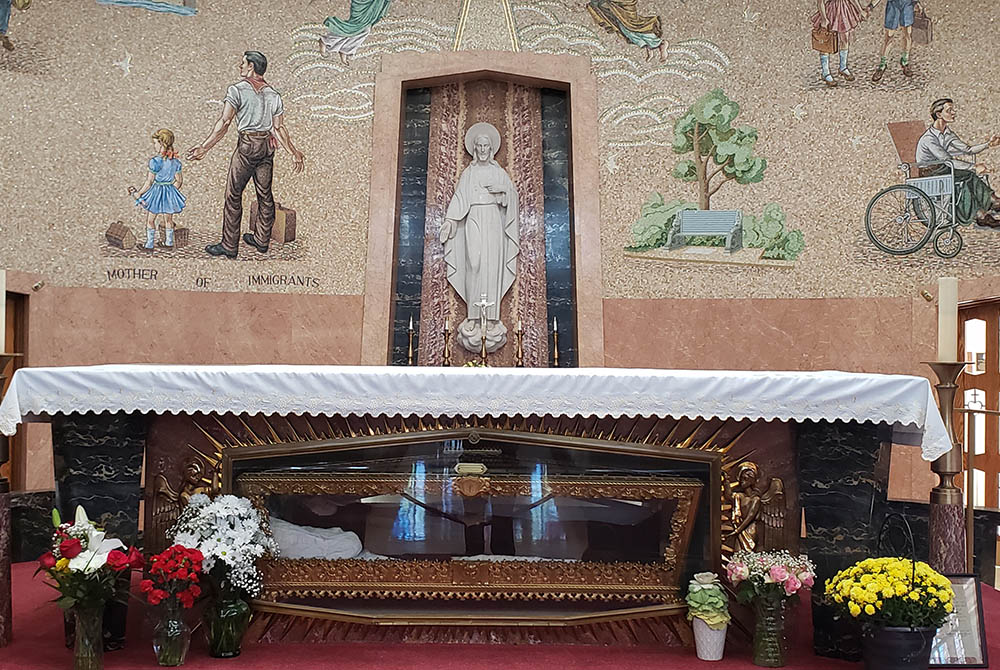
A shrine honors St. Frances Xavier Cabrini at the tip of Fort Tryon Park in Upper Manhattan in New York City. Her remains are on display in an altar placed in a light-filled chapel that daily attracts visitors from throughout the world. A handsome marble-and-glass mosaic depicting Cabrini's life surrounds the altar. (GSR photo/Chris Herlinger)
The pope told Cabrini to go west, not east
Frances Cabrini, born near Milan, Italy, "grew up enthralled by the stories of missionaries and made up her mind to join a religious order," an online biography of Cabrini (1850-1917) by her congregation notes.
In 1880, she and seven other young women founded the Institute of the Missionary Sisters of the Sacred Heart of Jesus and initially wanted to be missionaries in China, the biography says. But in an 1887 meeting with Pope Leo XIII, "the Pope told Frances to go 'not to the East, but to the West' to New York rather than to China as she had expected. She was to help the thousands of Italian immigrants already in the United States."
That ministry began in New York City, a place that, at the time, "seemed to be filled with chaos and poverty." Cabrini and her sister companions, the biography says, "organized catechism and education classes for the Italian immigrants and provided for the needs of the many orphans. She established schools and orphanages despite tremendous odds."
Eventually, Cabrini's ministries spread to Europe, Central and South America, as well as other locales in the United States. In 1946, Pope Pius XII canonized Cabrini "in recognition of her holiness and service to mankind and was named Patroness of Immigrants in 1950."
Cabrini's grit and example mirror the present moment, Ramirez said, with immigrants more determined than ever "to provide for their families. People say, 'We just want to work.' "
Veronica Garcia is a living example.
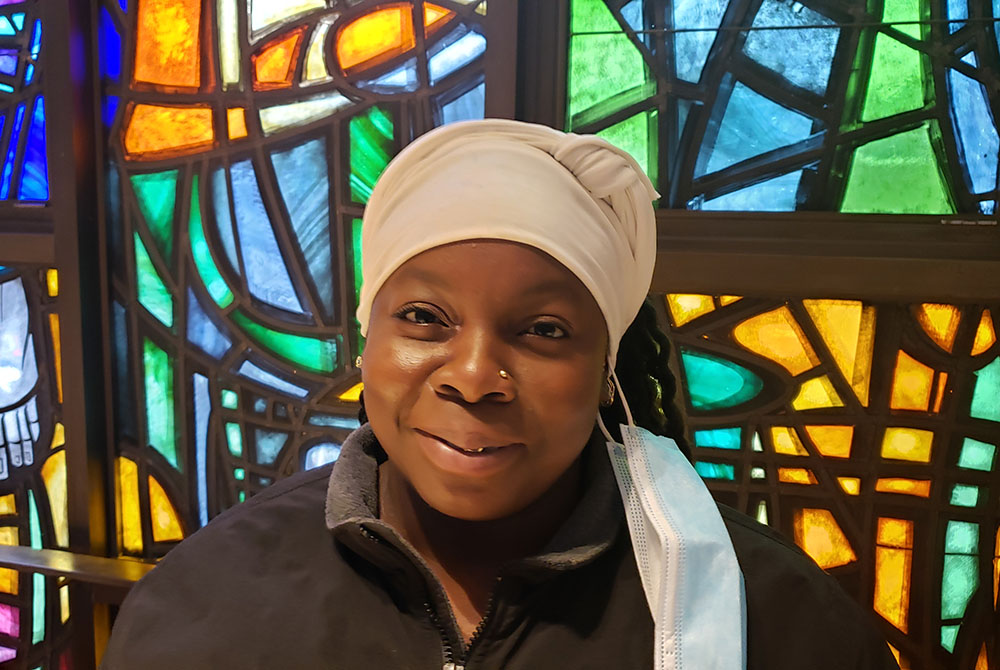
Veronica Garcia at her home parish, St. Frances of Rome Church in the Bronx, New York City. Cabrini Immigrant Services' legal services helped Garcia settle her immigrant status, and she receives food twice a month as one of the agency's regular clients. (GSR photo/Chris Herlinger)
The Honduras native left her home country in 2006 seeking a better life, saying the economic and social situation in Honduras' Caribbean coastal areas had become grim. She also wanted to reunite with her mother, Maura, who has lived in New York since the late 1980s.
After crossing into Texas from Mexico, Garcia made her way to New York City, reunited with her mother, eventually married, had two children — a 10-year-old son and 7-year-old daughter — and got work as a mechanic. She now lives in the New York City borough of the Bronx.
Cabrini's legal services helped Garcia settle her immigrant status, and she has now had legal residency in the United States for three years. However, she lost her job as a school bus mechanic because of the pandemic's closure of schools, and support from relatives is keeping her immediate family afloat.
Garcia, 33, receives food twice a month as one of the agency's regular clients, and she said she owes a huge debt to the agency.
Advertisement
"They have helped a lot," Garcia said in an interview after Sunday services at St. Frances of Rome Church, her home parish in the Bronx.
She credits Ramirez and Flores for engendering a sense of community among the Cabrini clients.
"It's the best place," Garcia said. "It's like a family: a safe place, confidential. I appreciate that."
"When you have friends like Yolanda and Javier," she said, pausing. "Well, they hear me."
Despite the current challenges, Garcia said she expects things will eventually turn around. "When you come here for a better life, you have to work hard. And I like to work."
Mindful of Mother Cabrini's example
Flores and other Missionary Sisters who have worked with Cabrini Immigrant Services through the years are mindful and proud of the legacy bestowed on them and their congregation.
"The dignity and respect of the other person is so important to us," Flores said. "So is welcoming. That's one of the legacies she passed on to us."
That legacy is widely recognized, perhaps no more so than in the quintessential city of immigrants.
At the tip of Fort Tryon Park in Upper Manhattan, a shrine honors Mother Cabrini. Her remains are on display in an altar placed in a light-filled chapel that daily attracts visitors from throughout the world. A handsome marble-and-glass mosaic depicting Cabrini's life surrounds the altar.
For years, this was the main site of veneration for Cabrini in Manhattan. But now, there is a second. On Columbus Day, New York Gov. Andrew Cuomo unveiled a monument honoring Cabrini and her ministry in lower Manhattan's Battery Park, a site that overlooks the Statue of Liberty and Ellis Island, two New York City landmarks revered for their connection to immigrants.
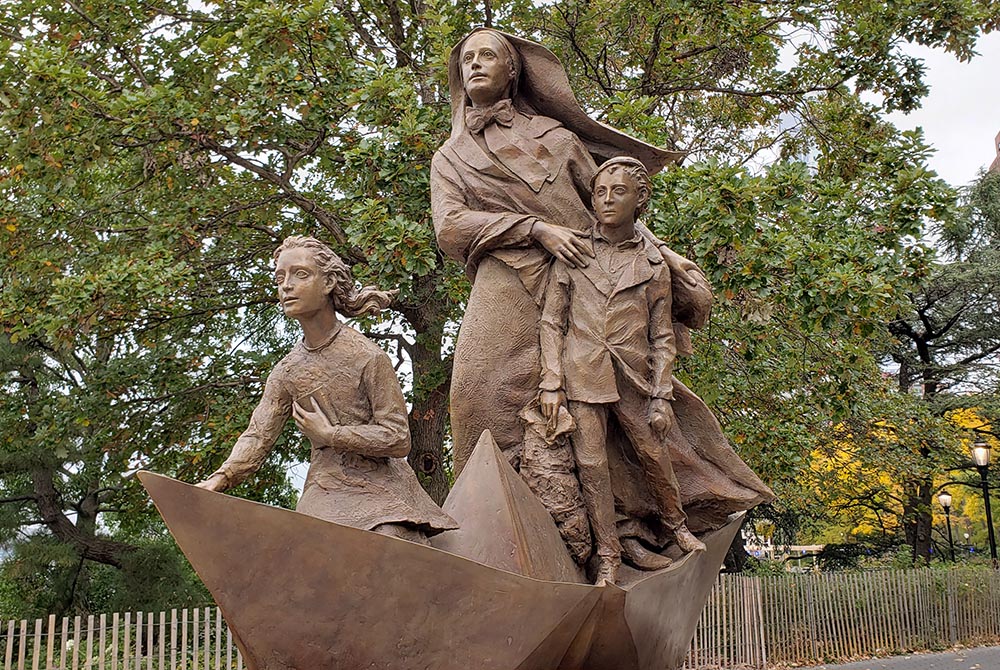
On Columbus Day, New York Gov. Andrew Cuomo unveiled this monument honoring St. Frances Xavier Cabrini and her ministry in lower Manhattan's Battery Park, which overlooks the Statue of Liberty and Ellis Island, two New York City landmarks revered for their connection to immigrants. (GSR photo/Chris Herlinger)
The monument had been the source of some controversy between the state of New York and the city of New York: The city had developed a list of "undersung female leaders" to honor, and it did not include Cabrini, The New York Times reported.
But the governor's influence helped the project along. In his dedicatory remarks Oct. 12, Cuomo, who is Catholic, said the celebration of Mother Cabrini "is even more appropriate than when we announced it last year because of the difficulties that we are facing. We all know that these are challenging times, but we also know that in the book of life, it is not what one does when the sun is shining that tests our mettle; it's what one does in the fury of the storm, and that's where we are today.
"In this complex world, may this statue serve to remind us of the principles that made us great as a country and as a people and the principles that keep us special on this globe, the values of Mother Cabrini: compassion, acceptance, community, freedom, faith, hope and love."
Certainly, a feeling of hope and love were on display during the recent Tuesday morning food distribution. Things bustled, with food packages carefully put out then distributed outside.
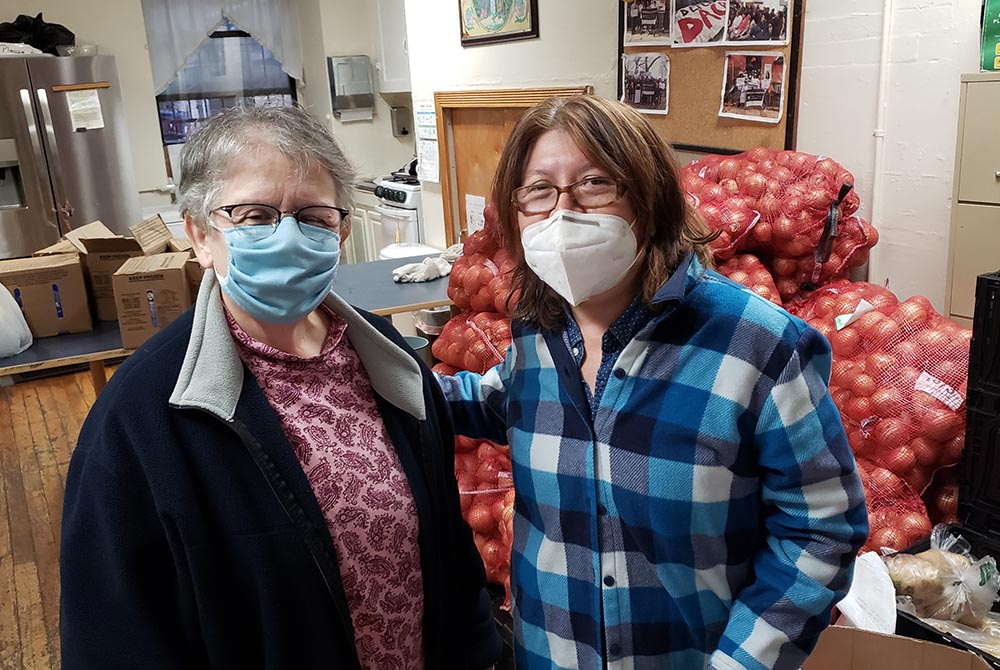
Sr. Antonina Avitabile of the Missionary Sisters of the Sacred Heart of Jesus, left, and Margarita Tlaseca Vides regularly volunteer at the food pantry at Cabrini Immigrant Services. (GSR photo/Chris Herlinger)
Missionary Sr. Antonina Avitabile was there, working in tandem with fellow volunteers Heather Lee and Margarita Tlaseca Vides and food pantry manager Jo Lee.
Here, you hear a number of different languages — English, Mandarin, Spanish, French — and it is not hard to imagine that Mother Frances Cabrini would be proud of the work.
"It's a blessing to see us working together, all different nationalities," Avitabile said. "Here, we all lend a hand together."
[Chris Herlinger is GSR New York and international correspondent. His email address ais cherlinger@ncronline.org.]







